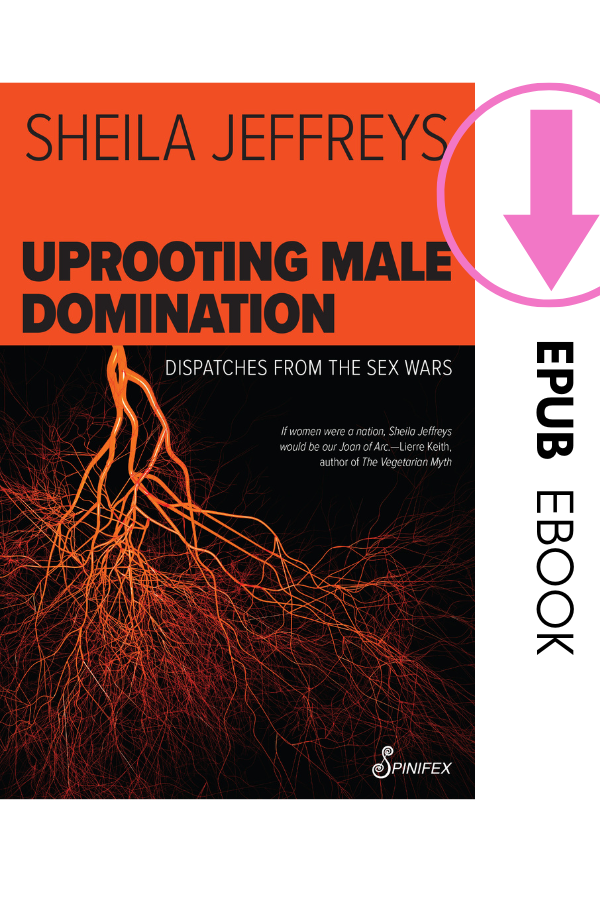Julia Long launches Uprooting Male Domination by Sheila Jeffreys
Julia Long shares her introduction to her talk with Sheila Jeffreys about Uprooting Male Domination: Dispatches From the Sex Wars from the online book launch, Wednesday 27 August 2025
It’s my very great pleasure to launch this book, which is comprised of talks given by Sheila from 2011; most were written in the past five years, many are still available to view online. It opens with Sheila’s acceptance speech for the richly-deserved Lifetime Achievement Award bestowed on her by the Spanish Association of Progressive Women. This is followed by four main sections:
The Nuts and Bolts of Male Domination
The Prostitution and Reproductive Technology Industries
Challenging ‘Gender Identity’ Politics
Lesbian Feminist Politics
It is a brilliant and very readable collection and the perfect follow-up to Penile Imperialism (Spinifex, 2022) in its extensive and fearless analysis of male domination. It picks up many of the themes of that book, expanding on them and offering further insights. Sheila not only offers a meticulous analysis of well-recognised systems of oppression such as the sex industry but she also boldly goes where no woman (or very few of us!) have gone before, whether this is dissecting the horrors of nappy (diaper) fetishism, exposing men’s sexual violation of women in supposedly wholesome pursuits such as naturism or simply noticing and analysing the significance of mundane, everyday events: the expressions on the face of a young mother humouring an old man while grocery shopping or the fact that we cannot watch the evening news without ‘engaging in the degradation of a woman’ because unless we close our eyes we are forced to witness female newsreaders wearing debilitating, high-heeled fetish shoes. And she points out that none of these things is inevitable or biologically-determined but rather socially constructed in the service of male domination and the male sex-right. (And this is a very necessary antidote to a retrograde tendency in GC circles towards biological determinism).
Sheila is, we might say, a ‘snapper up of unconsidered trifles’; she notices how deeply male domination is embedded in the ordinary - she draws our attention to the ubiquity of women’s long hair hanging down like curtains, to little girls wearing skirts that restrict their physical movement - and insists on their political significance, as second wave feminists examined every aspect of their lives through the understanding that the personal is political. A deeply satisfying aspect of the book is the way in which that crucial insight of the Women’s Liberation Movement informs Sheila’s analysis.
If I had to say three things I like about this book, they would be: the quality of the analysis; the writing style; and the book’s authoritativeness. I’ll say something briefly about each of these.
1. The quality of the analysis is exemplified in the first section – ‘The Nuts and Bolts of Male Domination’ – which has chapters titled ‘What is wrong with equality?’ and ‘The Problem of Free Speech’. Both ‘equality’ and ‘free speech’ are generally seen in much current discourse as unproblematically ‘good things’ but Sheila’s analysis goes way beyond that, pointing out how ‘equality’ measures fail to take account of the ‘affirmative action programme for men’ provided by marriage and the fact that all social institutions and practices are created in men’s image. Similarly, she shows that ‘freedom of speech’ has historically meant very different things for men and women, that speech can be a tool used to create and enforce social inequalities and that men use the notion of ‘free speech’ to defend their ‘right’ to pornography. And then later in the book, as we will discuss, her analysis of transgenderism as a men’s sexual rights movement was years ahead of the general GC understanding of the problem. This is all crucial analysis that we ignore at our peril.
2. The writing style. These pieces were written as talks on topics that Sheila considered to be urgent and pressing. The writing style conveys that urgency: it is wonderfully clear and has a vivid, direct quality which is a pleasure to read, even when the subject matter is thoroughly grim. It is exhilarating and galvanising. The book is never boring - it burns with truth and conviction!
3. The book is authoritative. Each piece is informed by decades of experience, knowledge and expertise. Sheila’s work provides a direct link to the WLM, to the radical feminist analysis that flourished in the 1970s and 80s, and her writing brings that analysis to bear on all the subsequent developments right up to the present day. Sheila’s commitment to women – through radical feminist activism and scholarship - has been lifelong and unwavering, and in commending this book to you I can do no better than echo the words of Lierre Keith: ‘If women were a nation, Sheila Jeffreys would be our Joan of Arc.’



